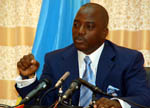
Congo watchers in D.C. got an inside look last week at the politics surrounding the country’s presidential election, coming up in November. As part of a panel series sponsored by the Center for Strategic and International Studies’ Africa Program, opposition leader and presidential candidate Vital Kamerhe discussed the current political environment in Congo, preparations for the elections, and the potential formation of a unified opposition against current President Joseph Kabila. (A video of the full event is here).
Kamarhe, the president and co-founder of the Union for the Congolese Nation, or UNC, formerly served as Kabila’s presidential campaign manager during the 2006 elections and was later elected to parliament serving the Bukavu district of South Kivu. In December Kamarhe resigned from parliament and began a tour of Congo signifying the start of his presidential bid.
The election season in Congo has already been controversial. Last month, as reported by Enough field researcher Fidel Bafilemba, President Kabila revised the electoral law in the Congolese constitution to eliminate the multi-round run-off vote system. With the new rules, the candidate with the largest percentage of votes—even if not a majority—would win the election.
According to Kamarhe, this constitutional review was prompted by his parliamentary resignation and the jubilant return of veteran opposition leader Etienne Tshisekedi to Kinshasa after five years of medical exile abroad. With Tshisekedi abroad and 2006 presidential contender Jean-Pierre Bemba standing trial at The Hague, Kabila and his inner-circle previously regarded this year’s elections as a sure-bet. Now they are showing signs of concern about the revitalized opposition movement.
The elimination of a second round of voting has prompted discussion of a political triumvirate, unifying the opposition leaders of Tshisekedi, Kamerhe, and Bemba’s MLC party. Kamerhe spoke in support of such a union and continuously reiterated his call for cooperation among the opposition in combating Kabila and the current power.
In calling for a prosperous, stable, and strong Congo, he expounded upon his “vision for the Congo” which included plans for army reform, economic development programs, an end to corruption in the justice system, respect for human rights, and an end to impunity for those committing atrocious acts of sexual violence. Though his rhetoric touched upon many of the problems currently plaguing the region, it is yet to be seen whether a candidate with such close ties to the current government could really be the reformer he espouses to be.
Further, his pledge to build a nation that respects human rights must also be regarded as suspect. Kamarhe has continuously aligned himself with Bemba, visiting the indicted war criminal at The Hague and calling him a friend. Even if this respect for Bemba is mere political posturing to secure the MLC’s supporters that earned Bemba 42 percent of the vote in the 2006 elections, it is nearly impossible to regard Kamarhe’s human rights rhetoric as credible when he so closely allies himself with someone on trial for crimes against humanity and war crimes—including murder, rape, and pillaging.
This year’s presidential contest has garnered far less international attention – judging by engagement and financial support– in comparison to the strong interest in Congo’s historic election of 2006. This year’s election – only its second in nearly 50 years – is an important moment for Congo. It provides an opportunity for the international community to draw attention to governance and press for reforms on issues that fuel and perpetuate conflict in the country, like security, corruption, human rights, economic development, and natural resource management.
The brewing controversy apparent in Kamarhe’s remarks – and those by other opposition candidates – should also be a reminder of how volatile an election in Congo could be. At the very least, the international community, including the U.S. governement, should work to ensure that the vote doesn’t spur new conflict in a country already over-burdened.
Photo: Congo President Joseph Kabila (AP)

